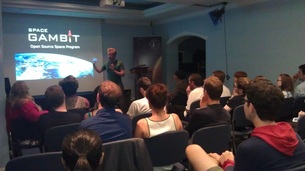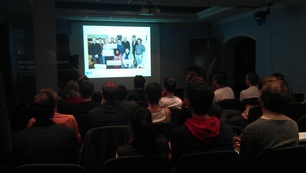|
On the 28 August 2013, we've had our second event on space: "Getting Going with Space, hands on"! The British Interplanetary Society generously hosted the event. We have the great pleasure of meeting the Chairman of the BIS: Alistair. Alistair has kindly showed us around the library of the BIS just before the talk begin - a reward to all those who arrived early! Open source is a familiar term for those who are used to working in the software industry, but hang on, did we hear "open source space program"? Yes, that's what Alex from SpaceGambit UK spoke about. It's enabled by makerspaces/ hackerspaces x open source hardware x open source software. All these openness helps to advance our curiosity and technology. Open hardware like Arduino is cheap, like 30GBP. The wiring diagram is open to public, so you can make your own if you wish. More importantly because the schematics are open, it makes it easier for people to create an enhanced version, or other breakout boards (think of plug-ins) based on this. And what is an Arduino anyways? As we later hear, "it's like an electronic cellotape", said Laurence, referring to it being something that gets thrown at any problem without putting in a huge investment.  Space Gambit is looking to promote space through in education, challenges (working with NASA - NASA Asteroid Grand Challenge) and funding projects. The project funded by Space Gambit under the space habitat theme included bio-reactors and Mars spacesuit (the glove - we all have to start somewhere). A list of all project funded can be found on their recent announcement: http://www.spacegambit.org/spacegambit-announces-project-funding-for-hackerspace-space-program/ Watch out for future rounds of funding in 2014 from Space Gambit, with each project getting up to $20000. [Slides for this will be uploaded shortly.] Laurence, a physicist working on the software of a Sprite - a spacecraft from the KickSAT project - has convinced us on citizen contribution to a space project. Writing code for Arduino in SPAAAAAACE! An amazing retrospective on the KickSAT project. He also covered the the topic of small satellites and how it helped us to kick start the personal space age. The slides can be found here: http://prezi.com/tmzdf0zawh-d/kickstarting-the-personal-space-revolution/?utm_campaign=share&utm_medium=copy  Laurence introducing the dev team behind the BIS backed KickSAT Sprites. The British Interplanetary Society has backed a fleet of Sprites of the KickSAT project and Laurence has been working on the software of this fleet. He showed us the code that would be loaded onto the spacecraft on one page, all written in the familiar Arduino IDE (Energia). We've completely packed the house at the British Interplanetary Society. We've also occupied the entire length of tables right in front of the bar (if anyone has got a photo of that to share, send it over)!
Alex spoke about putting the inventor back to Citizen Inventor! We hope you are now really convinced to go ahead and get hands on - start a project, contribute ideas, update our wiki with useful resources: http://citizeninventor.wikia.com/wiki/CitizenInventor_Wiki, share your project http://www.citizeninventor.com/submit-to-showcase.html, tweet to us.... the list goes on! You've heard of Movember, do you know about Maptember? Nop, Maptember has got nothing to do with growing mustache, it's all about mapping! Three of the greatest geographic and mapping meetings is happening all on one piece of land - UK, this year. But that's not it, there're a lot of related events - check out http://www.maptember.org/. If you haven't already book yourself into State Of The Map 2013 when we last posted about early bird tickets, you can still get tickets before 5 Sept - it's not too late yet. Have you missed the Pocket Spacecraft's mission to moon on Kickstarter (http://www.kickstarter.com/projects/1677943140/send-your-own-pocket-spacecraft-on-a-mission-to-th)? It has ended, but it is now funded as well (yes, just not totally by the crowd!). Ok, before it all started to sound confusing, that project is still going ahead outside of kickstarter, but all the rewards and schedule is still happening as per the Kickstarter page. 399GBP will get you two that you can write some software for (one to land in the earth, one to the moon) - but there are plenty of options from 1GBP as you can see on the Kickstarter page. Choice ranges from just having your picture on a spacecraft to having your hardware and software on board - there's something for everyone. Here is your last chance! Pocket Spacecaft is offering Citizen Inventor members a last chance to pledge to this project (via paypal this time) by 6Sept, from which point, rewards will start to ship! Michael Johnson spoke to us on our first Citizen Inventor event, so he should be familiar - he is also the co-creator of KickSAT! Check out our earlier post for an example of the spacecraft (yes, the thin film that looked like the tax disc - the real thing will have printed electronics instead!). All you have to do is to is: 1) Make sure you have a membership with Citizen Inventor - sign up at: http://www.meetup.com/CitizenInventor/ 2) Go to http://pocketspacecraft.com/ - click the green button to join the mission, make sure you select "Citizen Inventor" as your society, select the "reward" (detail as per kickstarter page) before you submit. There you go, you are now part of the crowd that funded a space mission! |
SubscribeCategories
All
Archives
December 2016
|

 RSS Feed
RSS Feed
